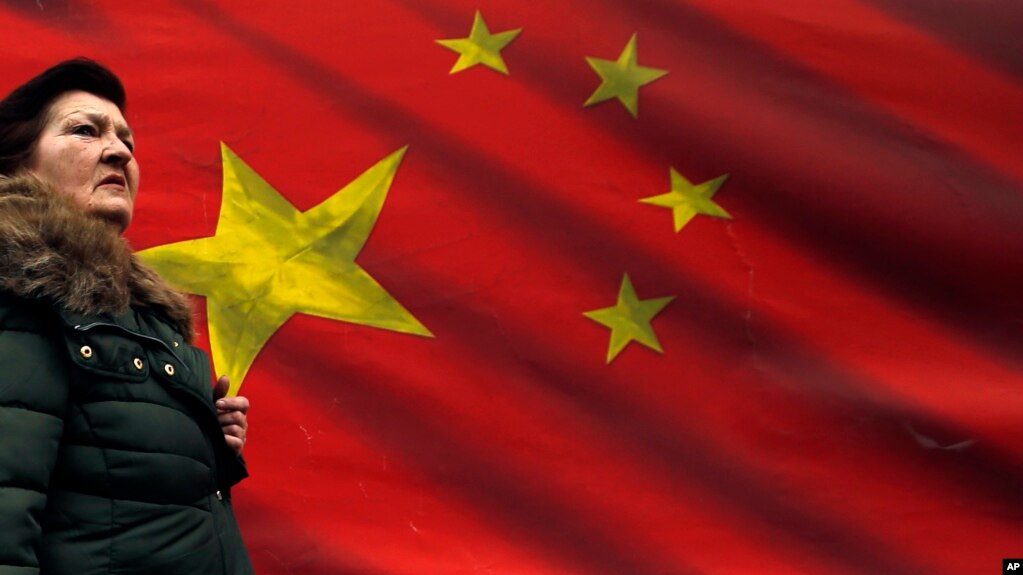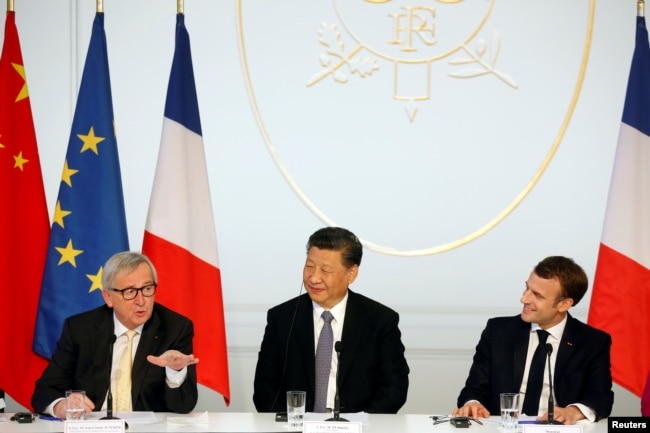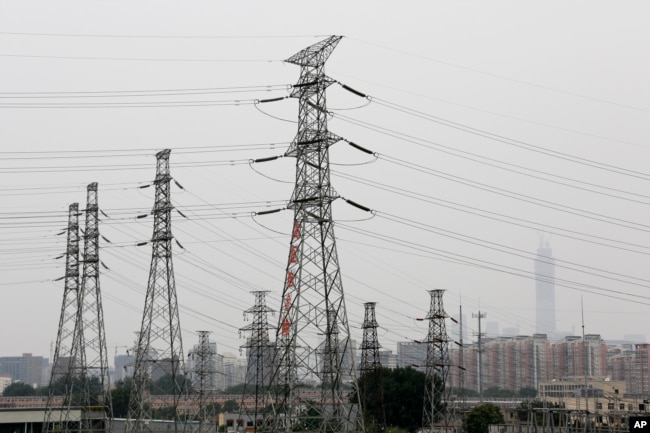Associated Press
 In this photo taken Friday, March 1, 2019, a woman walks by Chinese flag placed on a street in Belgrade, Serbia.
In this photo taken Friday, March 1, 2019, a woman walks by Chinese flag placed on a street in Belgrade, Serbia.BELGRADE, SERBIA — Coal-powered plants, mobile networks, major bridges, roads and railways: Chinese investments have been booming throughout Central and Eastern Europe's cash-strapped developing countries, even as European Union officials scramble to counter Beijing's mounting economic and political influence on the continent.
EU member Croatia is hosting a summit Thursday between China and 16 regional countries -- the 8th so far -- that focuses on expanding business and other links between China and the region, which Beijing sees as a gateway into Europe.
The gathering in Dubrovnik of the so-called 16+1 initiative consists of Central and Eastern European countries that have endorsed China's ambitious global "Belt and Road'' investment project, which has triggered concerns among some key EU states about increased Chinese political and economic clout in the region.
China has already invested billions of dollars in various infrastructure projects in Central and Eastern Europe.
Western leaders worry that further investment in the states that are EU members -- or those hoping to join -- could mean lower environmental and other standards than those in the rest of the bloc.
Thorny issues include the flouting of EU competition rules, potential over-borrowing by some of the states, the quality of constructions, and security concerns over high-speed 5G network technology supplied by Chinese companies.
Thorny issues include the flouting of EU competition rules, potential over-borrowing by some of the states, the quality of constructions, and security concerns over high-speed 5G network technology supplied by Chinese companies.
Critics also say that in return for allowing Chinese expansion into the region, Beijing should give better reciprocal access for European companies to Chinese markets.
Top Chinese officials have sought to alleviate EU fears of unfair competition from Chinese state-controlled companies, which benefit from the government's financial backing.
Top Chinese officials have sought to alleviate EU fears of unfair competition from Chinese state-controlled companies, which benefit from the government's financial backing.
Chinese dictator Xi Jinping agreed during a recent visit to Paris to work with European leaders to seek fairer international trade rules.
 French President Emmanuel Macron, Xi Jinping and European Commission President Jean-Claude Juncker hold a news conference with German Chancellor Angela Merkel at the Elysee presidential palace in Paris, France, March 26, 2019.
French President Emmanuel Macron, Xi Jinping and European Commission President Jean-Claude Juncker hold a news conference with German Chancellor Angela Merkel at the Elysee presidential palace in Paris, France, March 26, 2019.
Of the 16 participating countries -- Albania, Bosnia, Bulgaria, Croatia, the Czech Republic, Estonia, Hungary, Latvia, Lithuania, Macedonia, Montenegro, Poland, Romania, Serbia, Slovakia, and Slovenia -- 11 are EU member states, and the remaining five want to join.
Beijing has marketed its expanding initiative as a way to give some of Europe's neediest countries a financial boost, helping them gain access to more trade and investment.
 French President Emmanuel Macron, Xi Jinping and European Commission President Jean-Claude Juncker hold a news conference with German Chancellor Angela Merkel at the Elysee presidential palace in Paris, France, March 26, 2019.
French President Emmanuel Macron, Xi Jinping and European Commission President Jean-Claude Juncker hold a news conference with German Chancellor Angela Merkel at the Elysee presidential palace in Paris, France, March 26, 2019.Of the 16 participating countries -- Albania, Bosnia, Bulgaria, Croatia, the Czech Republic, Estonia, Hungary, Latvia, Lithuania, Macedonia, Montenegro, Poland, Romania, Serbia, Slovakia, and Slovenia -- 11 are EU member states, and the remaining five want to join.
Beijing has marketed its expanding initiative as a way to give some of Europe's neediest countries a financial boost, helping them gain access to more trade and investment.
That has been mostly welcomed by the Central and Eastern European nations.
Major Chinese-led infrastructure projects in the region include a planned high-speed railway from the Hungarian capital, Budapest, to Belgrade in neighboring Serbia.
Major Chinese-led infrastructure projects in the region include a planned high-speed railway from the Hungarian capital, Budapest, to Belgrade in neighboring Serbia.
The line will link up with the Chinese-controlled port of Piraeus in Greece as an entry point for Chinese goods to Central and Eastern Europe.
The project has drawn scrutiny from the EU because Chinese state-owned banks would provide financing, and Chinese companies would supply technology and the actual building.
The project has drawn scrutiny from the EU because Chinese state-owned banks would provide financing, and Chinese companies would supply technology and the actual building.
That conflicts with EU rules requiring public works to be broken into segments small enough to attract multiple bidders.
Hungarian Prime Minister Viktor Orban, whose own government often has been criticized for anti-democratic policies, says Hungary's relations with China should be based on "mutual respect.''
Hungary last year did not sign an EU report criticizing China's human rights record and business policies.
In Serbia, an EU membership candidate, Chinese companies are building major bridges and highways.
Hungarian Prime Minister Viktor Orban, whose own government often has been criticized for anti-democratic policies, says Hungary's relations with China should be based on "mutual respect.''
Hungary last year did not sign an EU report criticizing China's human rights record and business policies.
In Serbia, an EU membership candidate, Chinese companies are building major bridges and highways.
They are also constructing a large coal-powered electricity plant even as China is trying to curb pollution at home by implementing renewable energy projects and reducing the use of lignite, by far the most polluting fossil fuel.
 Power grid stand against the residential and office buildings in Beijing as the capital of China is shrouded by mild pollution haze on June 5, 2017.
Power grid stand against the residential and office buildings in Beijing as the capital of China is shrouded by mild pollution haze on June 5, 2017.
Serbian analyst Mijat Lakicevic said the strategically-located Balkan country situated between East and West is a perfect place where "China can realize its economic concept, the way it wants to enter (Eastern European) markets,'' without much concern over fair bidding processes or pollution standards.
Bosnia, a potential EU candidate, is at odds with the bloc over its decision to issue a public guarantee for a 600-million euro ($676 million) loan from China's Export-Import Bank to expand Bosnia's largest coal-fired power plant.
EU's energy watchdog has warned that the move could eventually harm Bosnia's bid to join the EU because the agreement violates EU's subsidy and environment rules.
 Power grid stand against the residential and office buildings in Beijing as the capital of China is shrouded by mild pollution haze on June 5, 2017.
Power grid stand against the residential and office buildings in Beijing as the capital of China is shrouded by mild pollution haze on June 5, 2017.Serbian analyst Mijat Lakicevic said the strategically-located Balkan country situated between East and West is a perfect place where "China can realize its economic concept, the way it wants to enter (Eastern European) markets,'' without much concern over fair bidding processes or pollution standards.
Bosnia, a potential EU candidate, is at odds with the bloc over its decision to issue a public guarantee for a 600-million euro ($676 million) loan from China's Export-Import Bank to expand Bosnia's largest coal-fired power plant.
EU's energy watchdog has warned that the move could eventually harm Bosnia's bid to join the EU because the agreement violates EU's subsidy and environment rules.
Enlargement Commissioner Johannes Hahn has said the issue "raises serious questions'' about the Balkan country's "commitment to international treaties (and) European rules.''
Chinese companies are also involved in the construction of a $380-million Peljesac bridge in Croatia, which links two coastal parts over the Adriatic Sea, as well as a highway linking the Adriatic in Montenegro to neighboring Serbia.
In the Czech Republic, the National Cyber and Information Security Agency followed U.S. authorities' warning against the use of hardware or software made by Chinese companies Huawei and ZTE.
Chinese companies are also involved in the construction of a $380-million Peljesac bridge in Croatia, which links two coastal parts over the Adriatic Sea, as well as a highway linking the Adriatic in Montenegro to neighboring Serbia.
In the Czech Republic, the National Cyber and Information Security Agency followed U.S. authorities' warning against the use of hardware or software made by Chinese companies Huawei and ZTE.
That, however, did not change Czech President Milos Zeman's positive stance toward Huawei.
Zeman publicly criticized the Czech watchdog, saying it harms the Czech Republic's business interests as it could affect Huawei's plan to invest $370 million in 5G networks in the Czech Republic.
U.S. officials mounted an international campaign to keep Huawei gear out of any foreign 5G network that might carry sensitive U.S. intelligence.
Zeman publicly criticized the Czech watchdog, saying it harms the Czech Republic's business interests as it could affect Huawei's plan to invest $370 million in 5G networks in the Czech Republic.
U.S. officials mounted an international campaign to keep Huawei gear out of any foreign 5G network that might carry sensitive U.S. intelligence.
/arc-anglerfish-tgam-prod-tgam.s3.amazonaws.com/public/KK7CBF7T25H3NAJGF4KD5PR5IA.jpg)